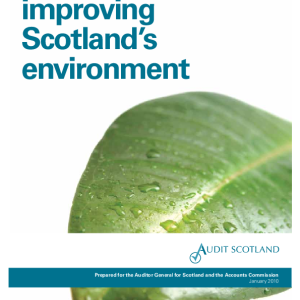Long-term commitment and strong leadership are needed to continue to improve Scotland's environment
In a wide-ranging report, Protecting and improving Scotland's environment, Audit Scotland looks at progress in improving air quality, the water environment, biodiversity and waste management.
The report says Scotland has successfully met several European and Scottish environmental targets. However, a number of targets, including some for air quality and biodiversity, have not been met. The report says protecting the environment is central to achieving the Scottish Government's goal of sustainable economic growth. The environment supports about 242,000 jobs, it affects health and quality of life, and is crucial to key Scottish industries such as tourism, agriculture, and food and drink.
The report finds that air quality in Scotland is generally good, but there are localised areas where the quality is poor, mainly as a result of road traffic pollution. The pollution from traffic is recognised as a health risk. Councils have declared 21 Air Quality Management Areas and most of these relate to traffic pollution but not all the actions needed to reduce traffic pollution are in the control of public bodies.
The Auditor General for Scotland, Robert Black, said:
“Air quality action plans can improve traffic management and emissions from buses, and taxis, but the Scottish Government, councils and their partners should work together to ensure that the public health risks of traffic pollution are minimised. They need to consider all possible means of improving air quality, particularly in the worst affected areas. I acknowledge that some mechanisms such as road charging may not be acceptable to the public, and others are matters of EU or UK policy, but this should not prevent progress.”
Over half of Scotland's waters currently meet the European standard of good ecological status. Mr Black said:
“It is clear that pollution from agricultural activity is now the main threat to the water environment. I welcome the progress being made by the Scottish Environment Protection Agency and its partners in strengthening the advice and oversight relating to agricultural pollution. This momentum needs to be maintained with the support of the agricultural industry.”
Regarding biodiversity, there is a range of strategies directed at protecting individual species or areas in Scotland. For example, there are 1892 different protected areas covering 19% of Scotland. But there has been mixed progress against the Scottish Government’s 17 biodiversity indicators.
Some important waste management targets on landfill and recycling are at risk of not being met. Chair of the Accounts Commission for Scotland, John Baillie, said:
“Councils play a key role in protecting and improving the environment, in particular, with regard to waste management. Since the publication of our 2007 report, Sustainable waste management, councils have made significant progress but it is concerning that, taken together, councils’ individual plans are not yet adequate to meet landfill targets beyond 2010.”
The report says that many areas of public policy have an impact on the environment. Mr Black said:
“From our overview it is clear that there has been encouraging progress in many areas. But for some policies, such as air quality and transport, and land management and water quality, there is a need for better coordination in thought and action at both national and local levels. There must also be strong leadership and long-term commitment to meeting environmental targets, particularly at a time when there may be considerable pressure to divert money to more immediate issues.”





